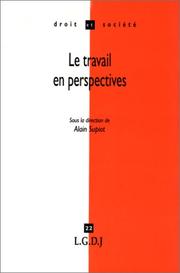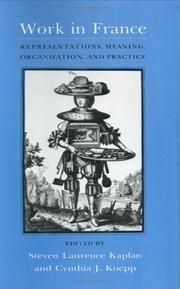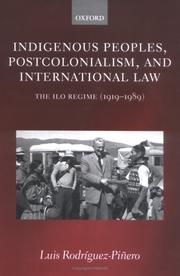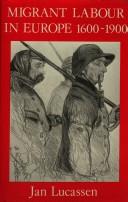| Listing 1 - 10 of 26 | << page >> |
Sort by
|

ISBN: 2275016694 9782275016696 Year: 1998 Publisher: Paris : Librairie générale de droit et de jurisprudence,
Abstract | Keywords | Export | Availability | Bookmark
 Loading...
Loading...Choose an application
- Reference Manager
- EndNote
- RefWorks (Direct export to RefWorks)
Labor laws and legislation --- Labor --- Work --- History. --- Labor laws and legislation - History --- Labor - History --- Work - History

ISBN: 0861873211 0865980950 9780865980952 9780861873210 Year: 1984 Publisher: Totowa, N.J. Rowman and Allanheld
Abstract | Keywords | Export | Availability | Bookmark
 Loading...
Loading...Choose an application
- Reference Manager
- EndNote
- RefWorks (Direct export to RefWorks)
Economics --- Classical school of economics --- Division of labor --- Capitalism --- History. --- Classical school of economics - History. --- Economics - History. --- Division of labor - History. --- Capitalism - History.

ISBN: 0801416973 9780801416972 Year: 1986 Publisher: Ithaca, N.Y.
Abstract | Keywords | Export | Availability | Bookmark
 Loading...
Loading...Choose an application
- Reference Manager
- EndNote
- RefWorks (Direct export to RefWorks)
History of France --- anno 1700-1799 --- anno 1800-1899 --- Labor --- Travail --- History --- Congresses --- Histoire --- Congrès --- Work --- Congresses. --- Congrès --- Work - Congresses - History --- Labor - History - Congresses - France
Book
ISBN: 9782070143412 2070143414 Year: 2014 Publisher: Paris: Gallimard,
Abstract | Keywords | Export | Availability | Bookmark
 Loading...
Loading...Choose an application
- Reference Manager
- EndNote
- RefWorks (Direct export to RefWorks)
Pourquoi, dans toutes les cultures, les femmes ont-elles été exclues de la chasse ? Pourquoi n'ont-elles pu ni monter à bord des navires ni être soldat ? Pourquoi leur a-t-on plutôt assigné les tâches de cueillir, de filer, de tisser, de tanner ? Qu'est-ce qui expliquerait qu'il existe des façons masculines et des façons féminines de couper, de creuser et de travailler la terre ? Dans cet essai qui conjugue audace intellectuelle et rigueur scientifique, Alain Testart montre que ce sont les croyances qui expliquent la différenciation des activités masculines et féminines et fait remonter leur origine à la lointaine préhistoire. Ces croyances, même tacites et irrationnelles, ont des effets puissants sur la réalité et obéissent à une logique cachée : celle du sang périodique des femmes, perçu comme une grave perturbation qui affecte l'intérieur de leur corps et les exclut de tâches particulières. Même si cette répartition traditionnelle des activités sera bientôt une chose du passé, elle ne laisse pas d'étonner par sa constance, sa quasi-universalité jusque dans les temps présents. Dans cet essai, Alain Testart nous entraîne pas à pas dans une réflexion d'une grande nouveauté sur le rôle du sang dans les représentations sociales et la constitution du genre.
Sexual division of labor --- Feminist anthropology --- Division sexuelle du travail --- Féminisme et anthropologie --- History --- Histoire --- Féminisme et anthropologie --- History. --- Sexual division of labor - History
Book
ISBN: 9782702165591 2702165591 Year: 2019 Publisher: 58-Clamecy: Paris: Impr. Laballery, Calmann-Lévy,
Abstract | Keywords | Export | Availability | Bookmark
 Loading...
Loading...Choose an application
- Reference Manager
- EndNote
- RefWorks (Direct export to RefWorks)
Le monde du travail que nous a légué le xxe siècle est en crise.Pendant près d'un siècle, il s'est organisé autour d'un contrat par lequel l'employeur garantissait un salaire, une relative sécurité de l'emploi et un statut social au travailleur. En échange, ce dernier consentait à une certaine forme d'aliénation. C'était le monde du labeur.Aujourd'hui, cependant, ce monde se désagrège : les salaires stagnent, les parcours professionnels deviennent chaotiques et l'on s'y ennuie de plus en plus.Heureusement, un nouveau monde est en train d'émerger, celui de l'ouvrage. On y réinvestit les valeurs longtemps négligées de l'artisanat : indépendance du travailleur, maîtrise de son temps et de ses tâches, attention aux besoins de l'utilisateur final… et incertitude quant à l'avenir. On y voit apparaître de nouvelles manières d'être au travail. On y réévalue les métiers naguère méprisés du quotidien, bouleversant les hiérarchies et interrogeant les assignations traditionnelles de genre.Laëtitia Vitaud resitue cette transition du labeur à l'ouvrage dans l'histoire, la décrit avec précision, chiffres à l'appui, et propose des pistes pour adapter le droit du travail, le management et les systèmes de protection sociale. Laëtitia Vitaud est agrégée d'anglais et diplômée d'HEC. Depuis 2015, elle développe une activité de recherche et de conseil auprès de grandes entreprises autour des thèmes du futur du travail et de la consommation. Elle est rédactrice en chef du média « entreprises » de la société Welcome to the Jungle. Laëtitia Vitaud vit et travaille à Londres
Sociologie du travail --- Organisation du travail --- Artisanat --- Aspect social --- Labor - History - 21st century --- Homers (Manufactures) - Forecasting --- Industrial sociology --- Labor --- Homers (Manufactures)

ISBN: 9780199284641 0199284644 Year: 2005 Publisher: Oxford Oxford University Press
Abstract | Keywords | Export | Availability | Bookmark
 Loading...
Loading...Choose an application
- Reference Manager
- EndNote
- RefWorks (Direct export to RefWorks)
Indigenous peoples --- Indigenous peoples (International law) --- Indigenous labor --- Legal status, laws, etc --- History --- Legal status, laws, etc. --- Indigenous peoples - Legal status, laws, etc. - History --- Indigenous peoples (International law) - History --- Indigenous labor - History
Book
ISBN: 9780375414145 0375414142 Year: 2015 Publisher: New York, N.Y. Alfred A. Knopf
Abstract | Keywords | Export | Availability | Bookmark
 Loading...
Loading...Choose an application
- Reference Manager
- EndNote
- RefWorks (Direct export to RefWorks)
"The epic story of the rise and fall of the empire of cotton, its centrality in the world economy, and its making and remaking of global capitalism. Sven Beckert's rich, fascinating book tells the story of how, in a remarkably brief period, European entrepreneurs and powerful statesmen recast the world's most significant manufacturing industry combining imperial expansion and slave labor with new machines and wage workers to change the world. Here is the story of how, beginning well before the advent of machine production in 1780, these men created a potent innovation (Beckert calls it war capitalism, capitalism based on unrestrained actions of private individuals; the domination of masters over slaves, of colonial capitalists over indigenous inhabitants), and crucially affected the disparate realms of cotton that had existed for millennia. We see how this thing called war capitalism shaped the rise of cotton, and then was used as a lever to transform the world. The empire of cotton was, from the beginning, a fulcrum of constant global struggle between slaves and planters, merchants and statesmen, farmers and merchants, workers and factory owners. In this as in so many other ways, Beckert makes clear how these forces ushered in the modern world. The result is a book as unsettling and disturbing as it is enlightening: a book that brilliantly weaves together the story of cotton with how the present global world came to exist"--
World history --- Cotton plantation workers --- Cotton textile industry --- Cotton trade --- Slavery --- Slaves --- Textile workers --- Capitalism --- Labor --- History --- Economic aspects --- Cotton textile industry - History --- Cotton trade - History --- Cotton plantation workers - History --- Slavery - Economic aspects --- Capitalism - History --- Labor - History
Book
ISBN: 9781786634108 1786634104 9781786634122 9781786634115 Year: 2018 Publisher: London Verso
Abstract | Keywords | Export | Availability | Bookmark
 Loading...
Loading...Choose an application
- Reference Manager
- EndNote
- RefWorks (Direct export to RefWorks)
Presents the history of labor from the thirteenth century up to the present, discussing how the definition and economic structures surrounding work have changed over time and how unpaid and exploited work is an ignored but vital part of the modern economy. -- "Say the word "work," and most people think of some form of gainful employment. Yet this limited definition has never corresponded to the historical experience of most people--whether in colonies, developing countries, or the industrialized world. That gap between common assumptions and reality grows even more pronounced in the case of women and other groups excluded from the labour market. In this important intervention, Andrea Komlosy demonstrates that popular understandings of work have varied radically in different ages and countries. Looking at labour history around the globe from the thirteenth to the twenty-first centuries, Komlosy sheds light on both discursive concepts as well as the concrete coexistence of multiple forms of labour--paid and unpaid, free and unfree. From the economic structures and ideological mystifications surrounding work in the Middle Ages, all the way to European colonialism and the industrial revolution, Komlosy’s narrative adopts a distinctly global and feminist approach, revealing the hidden forms of unpaid and hyper-exploited labour which often go ignored, yet are key to the functioning of the capitalist world-system. Work: The Last 1,000 Years will open readers' eyes to an issue much thornier and more complex than most people imagine, one which will be around as long as basic human needs and desires exist." -- Publisher's description
Employment (Economic theory) --- Labor --- arbeid --- Work --- Industry (Psychology) --- Method of work --- Work, Method of --- History --- 331 --- World history --- Human behavior --- Occupations --- Work-life balance --- Economics --- Social aspects --- History. --- 331. --- Labor - History --- Labor - Social aspects
Book
ISBN: 9782724626209 2724626206 Year: 2020 Publisher: Paris Sciences Po Les Presses
Abstract | Keywords | Export | Availability | Bookmark
 Loading...
Loading...Choose an application
- Reference Manager
- EndNote
- RefWorks (Direct export to RefWorks)
"Les récits de Conrad m'accompagnent depuis mon enfance. A cette époque, j'aimais surtout l'aventure, le bruit et le parfum de la mer. [... ] Je pensais avoir mis de côté Conrad jusqu'à ce que, il y a quelques années, un ami [... ] me dise : as-tu remarqué que tes terrains de recherche suivent à peu près les périples de Conrad ? ». Le livre de l'historien Alessandro Stanziani ne parle pas des voyages de Joseph Conrad, mais des travailleurs et des asservis que l'écrivain polonais a côtoyés : les serfs de Russie, les salariés et les marins des empires français et britannique, les esclaves et les immigrés de l'océan Indien. Il s'achève au Congo, dans les violences extrêmes perpétrées contre les indigènes par des compagnies coloniales en quête effrénée de profits. De la pensée des Lumières à l'évolution du droit et à la réalité des conditions de travail, Alessandro Stanziani montre par son approche globale que l'histoire du travail forcé ne peut se comprendre qu'en relation avec celle du travail libre. Les deux aires ne cessent de se superposer et de se répondre mutuellement pour écrire une seule et même histoire encore inachevée, celle d'une difficile émancipation."--
Travail forcé --- Forced labor --- Esclavage --- Slavery. --- Liberté du travail --- Free choice of employment --- Abolition. --- Histoire. --- History. --- Slavery --- History --- Abolition of slavery --- Antislavery --- Enslavement --- Mui tsai --- Ownership of slaves --- Servitude --- Slave keeping --- Slave system --- Slaveholding --- Thralldom --- Crimes against humanity --- Serfdom --- Slaveholders --- Slaves --- Compulsory labor --- Conscript labor --- Labor, Compulsory --- Labor, Forced --- Employees --- Forced labor - History - 18th century --- Forced labor - History - 19th century --- Slavery - History - 18th century --- Slavery - History - 19th century --- Enslaved persons --- Travail forcé --- Liberté du travail

ISBN: 070994117X 9780709941170 Year: 1987 Publisher: London
Abstract | Keywords | Export | Availability | Bookmark
 Loading...
Loading...Choose an application
- Reference Manager
- EndNote
- RefWorks (Direct export to RefWorks)
History of Europe --- anno 1500-1799 --- anno 1800-1899 --- Migrant agricultural laborers --- -Migrant labor --- -History --- History --- Migrant labor --- 314.7 <4> --- 331.5 <09> --- 940.2 --- Labor, Migrant --- Migrant workers --- Migrants (Migrant labor) --- Migratory workers --- Transient labor --- Employees --- Casual labor --- Agricultural migrants --- Migrant agricultural workers --- Migrant farm workers --- Migrants --- Agricultural laborers --- -History. --- -Migratie. Geografische mobiliteit. Verhuizingen--(demografie)--Europa --- Arbeidsmarkt. Werkgelegenheid --(algemeen)--Geschiedenis van ... --- Geschiedenis van Europa: Nieuwe en Nieuwste Tijd--(1492-heden) --- 940.2 Geschiedenis van Europa: Nieuwe en Nieuwste Tijd--(1492-heden) --- 331.5 <09> Arbeidsmarkt. Werkgelegenheid --(algemeen)--Geschiedenis van ... --- 314.7 <4> Migratie. Geografische mobiliteit. Verhuizingen--(demografie)--Europa --- Migratie. Geografische mobiliteit. Verhuizingen--(demografie)--Europa --- Arbeidsmarkt. Werkgelegenheid --(algemeen)--Geschiedenis van . --- Arbeidsmarkt. Werkgelegenheid --(algemeen)--Geschiedenis van .. --- Arbeidsmarkt. Werkgelegenheid --(algemeen)--Geschiedenis van --- Migrant agricultural laborers - - History - Europe --- -Migrant labor - - History - - 19th century - Germany --- -Migrant labor - - History - - 19th century - Benelux countries --- -Migrant labor - - History - Europe --- -Migrant agricultural laborers --- BELGIQUE --- MIGRATION INTERIEURE --- EUROPE --- CONDITIONS SOCIALES --- 19E SIECLE --- 18E-19E SIECLES --- -History of Europe
| Listing 1 - 10 of 26 | << page >> |
Sort by
|

 Search
Search Feedback
Feedback About UniCat
About UniCat  Help
Help News
News